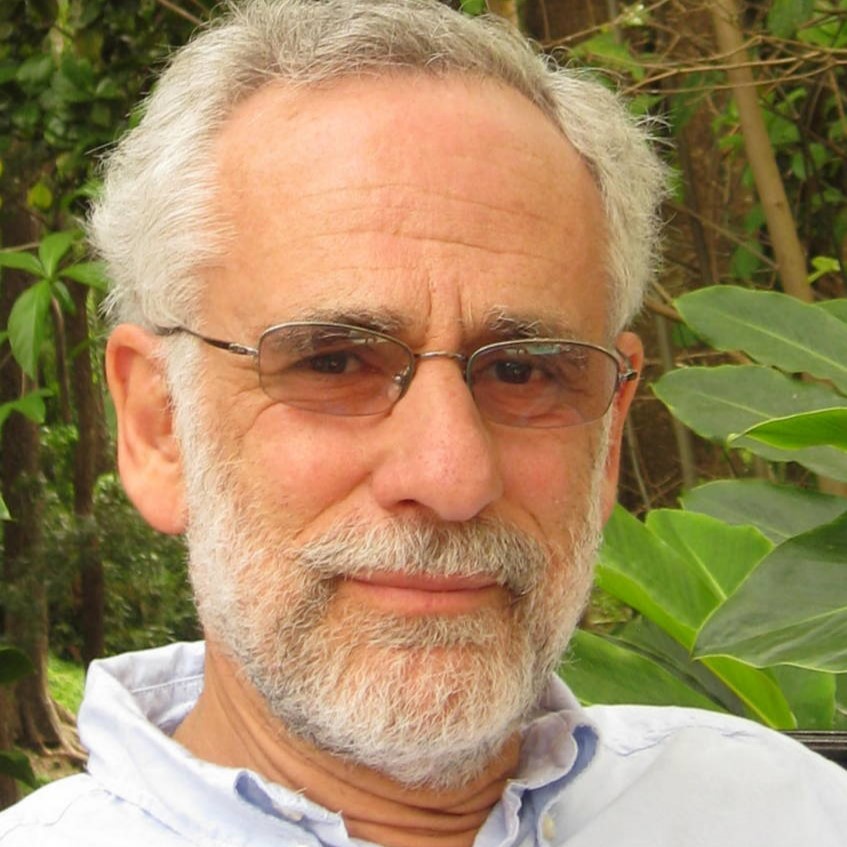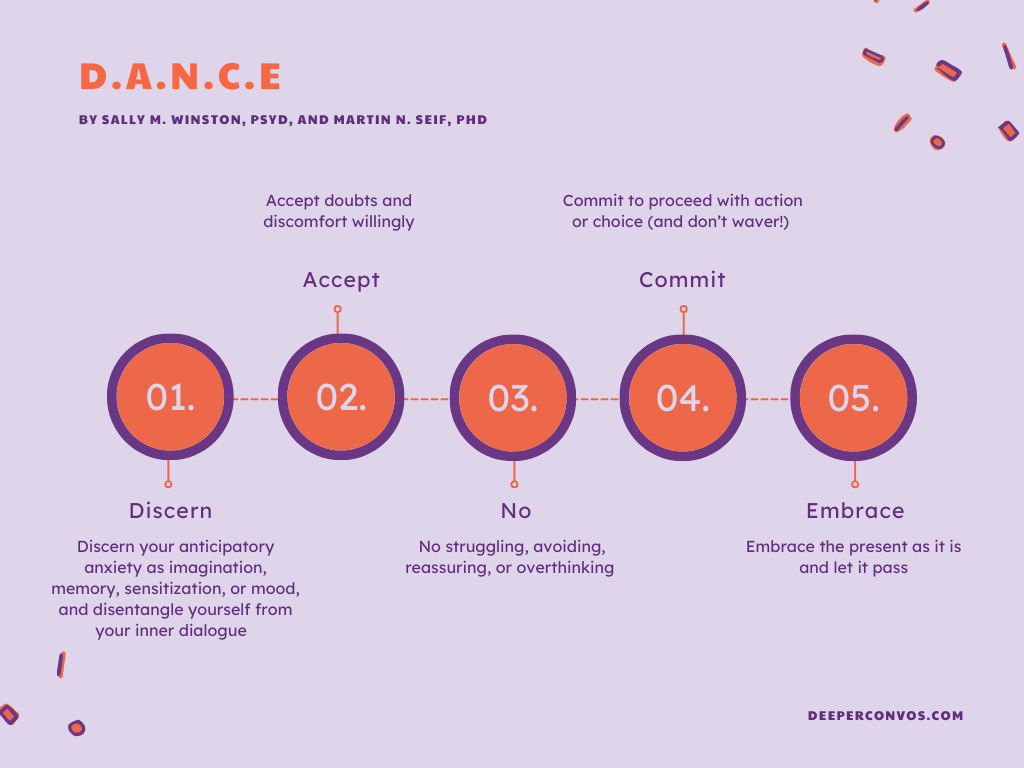Rating: ⭐⭐⭐⭐ (I dog-eared and underlined many pages!)
This book is for…
As anticipatory anxiety is often present across various mental health challenges, this book would be helpful for a lot of folks, including people who have social anxiety and have a history of avoiding social situations.
What makes the authors qualified to write this book?


With 80 years of combined experience as therapists, Sally M. Winston, PsyD, and Martin N. Seif, PhD, have a lot to share.
Both of them specialize in the treatment of anxiety disorders. They also helped found the Anxiety and Depression Association of America (ADAA). Dr. Winston was a founding clinical fellow, while Dr. Seif was a cofounder.
What is anticipatory anxiety?
Anticipatory anxiety is the anxiety you feel before a difficult situation or decision.

It’s the fear you feel on top of your main fear, say social anxiety. In other words, you’re “afraid of being afraid of being afraid”. This might sound complicated, but let me give you an example…
Let’s say you’re going to a party. You’re worried about getting nervous and making a fool of yourself, for example, spilling your drinks over a guest or sharing a joke that no one laughs at.
The more you worry, the more you get agitated by the worries you have.
“Gah, I hate worrying. It’s going to suck. I should just stay home… right?”
👉 Recommended article: Why do I get anxious before socializing?
More importantly, Dr. Winston and Dr. Seif said that anticipatory anxiety is “the main driver of avoidance”. But why is that a problem?
Well, as I wrote in my article on avoidance, avoidance is what maintains and increases social anxiety.
When you avoid something, you’re essentially teaching your brain that something is “bad” and you should be anxious about it.

Of course, not everyone reacts the same way to anticipatory anxiety. Here are the five most common ways and how they often lead to avoidance:
5 common ways that anticipatory anxiety manifests
1. White-knuckling
White-knuckling means forcing or willing yourself to do something without accepting the difficult emotions. Dr. Winston and Dr. Seif noted that this might be the most common way people cope with anticipatory anxiety.
Let’s use the party example again. You might tell yourself, “You said you are going to go. Don’t back out!” or “I just have to do it.”
This leads to increased anxiety, which means you either end up not going, or you engage in safety behaviors to feel “OK”.

Learn more about why you can’t force yourself out of social anxiety.
2. Debating whether to avoid
As you get closer to the actual event, the anxiety increases, which leads to you thinking, “Maybe I shouldn’t go?”
One second later, you backtrack: “Well I did say that I would go.”
You argue with yourself over and over again, which feels like a logical thing to do — you’re just weighing out the options, right? — but leads to even more anxiety. (More on why in a bit.)
3. Planning how to cope or escape
OK, after all this internal debate, you’re on the way to the party!
But because the anxiety is still there, and it’s uncomfortable, you want to make sure you have a “plan”…
Your plan is to scan across the room and find people you already know. You might also get a few drinks so that you’re more relaxed. You might even make sure that you know where the closest exit is (so that you can leave early)!

All this planning is a form of safety behavior, which helps you feel less anxiety in the moment, but increases the anxiety in the long run.
4. Oscillating avoidance
Even when you avoid a social situation, you might still feel socially anxious.
For example, you leave the party prematurely, and now you’re worried that the host is going to criticize you for it.
Dr. Winston and Dr. Seif aptly said:
“Damned if you do, damned if you don’t”

5. Trying to put it out of your mind
A subtle way to cope with anticipatory anxiety is forcing yourself not to think about it. This just doesn’t work, according to research.

(I’d argue that this is not that different from white-knuckling?)
To recap, the five ways that anticipatory anxiety manifests are:
- White-knuckling
- Debating whether to avoid
- Planning how to cope or escape
- Oscillating avoidance
- Trying to put it out of your mind
Notice what they all have in common?
Overthinking.
According to Dr. Winston and Dr. Seif, what ultimately maintains and increases anticipatory anxiety is too much thinking (in an attempt to avoid anxiety).
“Too much thinking is not solved by more thinking”
So what’s a better way to cope with anticipatory anxiety?
Lean toward your anxiety

This might sound absurd and even offensive. Shouldn’t you try to get rid of anxiety, or at least reduce it?
But recall the different ways that anticipatory anxiety manifests. All of them are about avoiding anxiety, which just doesn’t work in the long run.
What if it’s possible — better — to acknowledge your anxiety?
To be clear, this doesn’t come naturally or easily to most folks (including yours truly). Here’s what Dr. Winston and Dr. Seif said:
“Running away from or avoiding perceived danger is hardwired. It takes being committed to your recovery to willingly approach what you fear…”
“Decreasing anxiety in the long term often requires accepting greater distress in the short term”
To help you lean towards your anxiety, Dr. Winston and Dr. Seif laid out the DANCE framework:

- Discern your anticipatory anxiety as imagination, memory, sensitization, or mood, and disentangle yourself from all your inner dialogue
- Accept doubts and discomfort willingly
- No struggling, avoiding, reassuring, or overthinking
- Commit to proceed with action or choice (and don’t waver!)
- Embrace the present as it is and let it pass
(I’m definitely not doing their framework justice, since they go into each step with great detail and care. If this sounds appealing, consider grabbing the book on Amazon.)
Here are a few other things you can do:
- Say Yes (an Acceptance and Commitment Therapy technique)
- Accept your experience as is (one of my favorite mindfulness practices)
- Do a courage challenge (Dr. Winston and Dr. Seif highly recommended this)
Should you buy the book or not?
Maybe.
I personally enjoyed reading the words of wisdom from two experienced therapists, and I think they nailed an undercovered topic, but I’m also cognizant that the book is geared towards a more psychologically savvy audience.
This is the book for you if:
- You want something that’s deeper than the usual self-help
- You don’t mind grappling with psychology terms and concepts (they have a chapter on brain science, which I adore)
- You have struggled with anticipatory anxiety in social and other situations
- You have a history of being indecisive like me… (if so, this book will be a lifesaver!)
You can pick up the book here 👇
Note: If you buy the book via my link, I will earn a lil’ affiliate fee (less than a dollar for the average $20 book). I only recommend books that I’ve read and loved.
For something more layman but still well-researched, I would recommend Dr. Ellen Hendriksen’s How To Be Yourself (read my summary of the book here)
Interview with Dr. Winston and Dr. Seif
ADAA did an interview with both coauthors — check it out here:
Related articles

